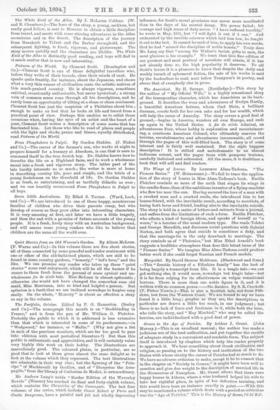The Wings of Icarus. By Laurence AlmaeTaderna. "The Pioneer Series."
(W. Heinemann.)—We fail to trace the applica- tion of the story of Icarus in Miss Alma-Tadema's book. Emilia Fletcher reminds us more of the moth that singes its wings in the candle-flame, than of the ambitious inventor of a flying-machine who flew too near the sun. Having secured the love of a man with a crooked nose and a crooked smile, she introduced him to her bosom-friend, with the inevitable result, according to novelists, of losing both lover and friend, leading also to the inevitable suicide. The story is told in a series of letters and extracts from a journal, and suffers from the limitations of such a form. Emilia Fletcher, who affects a kind of foreign idiom, and speaks of herself as "a worm," is a heroine of the usual modern type. She reads Tolstoi and George Meredith, and discusses social questions with Gabriel Norton, and both agree that suicide is sometimes a duty, and that the marriage-tie is the only drawback to marriage. The story reminds us of " Platonics," but Miss Ethel Arnold's book suggests a healthier atmosphere than does this latest issue of the "Pioneer Series." We imagine Miss Alma-Tadema could produce better work if she could forget Russian and French models.




































 Previous page
Previous page